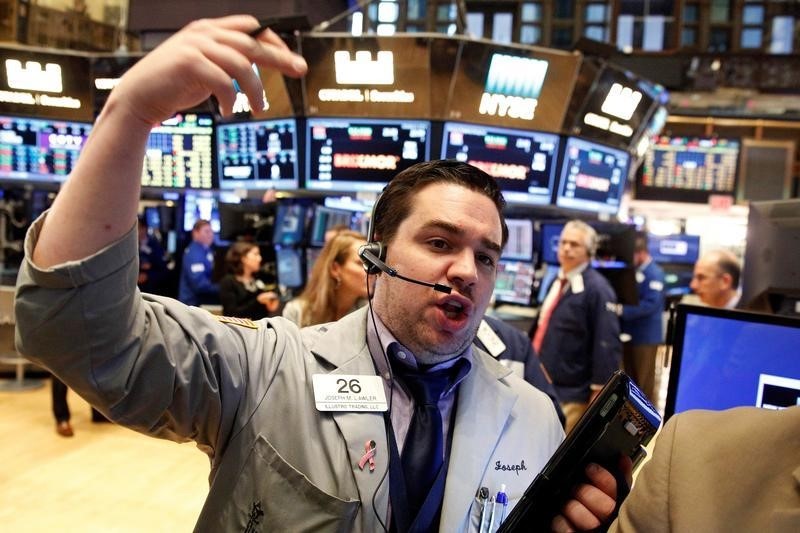TSX gains after CPI shows US inflation rose 3%
By Geoffrrey Smith
Investing.com -- Weekly jobless claims are expected to top 2 million for a 10th straight week but the rise in unemployment is expected to flatten out a bit. China approved a law that the U.S. said ends Hong Kong's autonomy, further stoking tension between the two. Stocks are set to open a tad lower, with social media giants in focus ahead of an expected executive order from President Donald Trump, and oil prices suffer a setback from a surprise rise in U.S. oil stocks. Here's what you need to know in financial markets on Thursday, May 28th.
1. Jobless claims and other data due
Weekly jobless claims are due at 8:30 AM ET, with another 2.1 million people expected to have filed initial claims last week. While that’s down from 2.44 million last week (a number that may be revised), it would still represent the 10th straight week that more than 2 million people have lost their job.
The continuing claims number, which will implicitly reflect how quickly people are getting back into the labor market, is expected to show a much smaller rise of less than 750,000 – albeit to a still-painfully high 25.75 million.
There are also durable goods orders due for April and revised GDP numbers for the first quarter. These are of more historical importance, however.
2. China approves Hong Kong security law
China’s National People’s Congress approved the country’s new law which would establish state organs of security in the autonomous city of Hong Kong, defying U.S. opposition. Officials insisted that the matter is an internal one only, despite China being bound by an international treaty that it signed with the U.K. back in the 1980s guaranteeing the city’s rights.
The U.S. government said on Wednesday that the law effectively ends Hong Kong’s autonomy, a judgment that paves the way for further U.S. measures against Chinese officials and companies.
The Hong Kong Hang Seng index fell another 0.7% but the yuan did not lose any more ground
Tensions between China and the West were also in evidence as a Canadian court approved the extradition of Huawei chief financial officer Meng Wanzhou for trial in the U.S. Beijing is also expected to impose additional restrictions on imports from Australia, which has called for an international inquiry into the origins of the Covid-19 virus. The country has already imposed an import ban on Australian beef and slapped tariffs on its barley imports.
3. Stocks set to open mixed
U.S. stock markets are expected to pause for breath at the open Thursday, after a breathless rally that has seen major indices recoup all the losses they have suffered since the U.S. started to go into lockdown.
That development is at odds with the tale of woe from the labor market and other hard data from the economy but is partially explained by the extraordinary infusion of liquidity by the Federal Reserve and U.S. government since early March.
By 6:30 AM ET (1030 GMT), Dow Jones 30 Futures were up 90 points, or 0.4%, while the S&P 500 Futures contract was flat and the Nasdaq 100 Futures contract was down 0.4%
European stocks meanwhile played catch up, still supported by the signals sent by the European Commission’s 750 billion euro ($825 billion) recovery package proposal on Wednesday.
4. Trump expected to sign executive order on social media companies
President Donald Trump is expected to signs an executive order aimed at social media companies on Thursday, ratcheting up his effort to tackle perceived anti-conservative bias on major platforms ahead of the key pre-election period.
Politico wrote that the order will be “broad and high level,” and likely to target a statute that has defended the platforms against legal liability for their content for over 20 years.
The move comes less than three days after Twitter for the first time marked Trump’s own tweets with an advisory that the information in them was unreliable.
Twitter (NYSE:TWTR) stock was down 2.7% and Facebook (NASDAQ:FB) stock was down 1.4% in premarket trade.
5. Oil prices hit by U.S. stock build
Crude oil prices are consolidating further after a surprise increase in U.S. crude stocks last week, according to the American Petroleum Institute.
The government’s own data from the Energy Information Administration are due at 10:30 AM ET.
By 6:30, U.S. Crude futures were down 1.3% at $32.37 a barrel, while the international benchmark Brent was up 1.2% at $35.03.
The move comes against a backdrop of signs that Russian companies are pushing back against plans to extend sharp cuts in output beyond the end of June. The Russian and Saudi Arabian governments nonetheless continue to talk about an extension.
